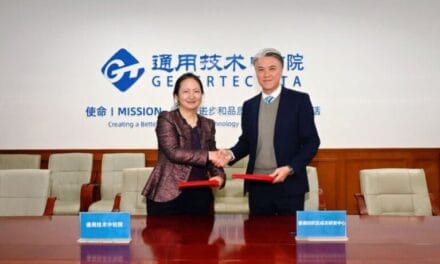 The American cotton industry, represented globally and in Türkiye by Cotton USA (CCI), is a key supplier of raw materials to the Turkish textile sector. American cotton producers have become essential partners for Turkish textile manufacturers, fostering strong collaborations and a solid institutional foundation. Despite facing periodic challenges, the flexibility and production power of the Turkish textile industry remain prominent. Nezihi Aslankeser, Director of Cotton USA’s EMEA Region, highlighted that Cotton USA does not position itself solely as a fiber supplier, but is also focused on enhancing the value of the supply chain and improving transparency.
The American cotton industry, represented globally and in Türkiye by Cotton USA (CCI), is a key supplier of raw materials to the Turkish textile sector. American cotton producers have become essential partners for Turkish textile manufacturers, fostering strong collaborations and a solid institutional foundation. Despite facing periodic challenges, the flexibility and production power of the Turkish textile industry remain prominent. Nezihi Aslankeser, Director of Cotton USA’s EMEA Region, highlighted that Cotton USA does not position itself solely as a fiber supplier, but is also focused on enhancing the value of the supply chain and improving transparency.
Stating that cotton production was negatively affected by the storms and hurricanes that hit the Southeastern part of America in particular and the drought in the Texas region, Aslankeser shared the following information: “Production is carried out in 17 states known as the cotton belt in America and unfortunately, due to the hurricanes and extreme heat, the lowest production amount of the last 5 years was realized. Therefore, production is expected to be 14.2 million bales. However, this situation will not create a negative outlook for the markets we have been supplying for many years and the supply processes will not be disrupted. Cotton orders are supplied on time and our customer support continues without interruption.”
He relayed that the American cotton industry focuses on increasing the sustainability and transparency standards of the textile and apparel industry beyond just offering a fiber by saying: “We believe that our sustainability platform and the US Cotton Trust Protocol add value to the Turkish textile industry. Although we are only in the fourth year of this protocol, we are receiving very serious demands from global brands. We think that pilot applications have started in Türkiye and that transition to scale-up orders, which represent a higher level, will begin in the coming period. When we say cotton, we are talking about a sustainable material. As Cotton USA, we are also taking steps to increase traceability so that the supply chain is more transparent. Producers and consumers can follow the trace of the raw material from the data in the field to our cotton bales until the final product. We are positioning ourselves as a reliable partner for the Turkish textile industry to have more advantages in the fields such as sustainability and transparency in the coming period.”
American cotton is trusted in world markets
Nezihi Aslankeser indicated that the supply chain should be transparent and certification processes should be clarified within the framework of branding processes, and American cotton provides direction and inspiration to the industry in these matters. He said: “As a third-generation member of a family that produces cotton, I can sincerely say that American cotton is highly trusted in world markets. When you include your cotton supply within the framework of a sustainable program, you directly reach a new level and become one of the sought-after companies in global markets. There is a clear difference between yarn made from American cotton and yarn made from cotton from different origins in the market. Textile manufacturers prefer us for high quality and trust. All textile manufacturers know that if contamination-free yarn is desired, the only solution is to use American cotton.”
Noting that the platforms and protocols offered by Cotton USA to its customers provide gains above the participation fee, he continued his words as follows: “When we look at both our sustainability and other certificates, we see that the membership cost is very low. However, we see that the services and support we provide to yarn manufacturers are much more valuable. Our Cotton USA Solutions team makes presentations to yarn factories, and our members can easily participate in our informative events. In addition, they can use the logo kits we provide, especially in their own marketing materials, fair stands, documents, websites and e-mails. This gives them both a sense of belonging and an identity. In short, I can clearly state that the benefit here is much higher than the cost.”
Aslankeser noted that cotton is the most consumed natural fibre in the world, excluding synthetic fibres, and stated that cotton has the lowest carbon footprint as a sustainable agricultural product. He relayed that cotton is a fibre that should be preferred in terms of health: “Cotton is a product that can be 100% returned to nature, there is no other fibre like it. It is important for our future that we prefer cotton more for both our nature and human health.”
One out of every three cotton used in Türkiye is American cotton
Saying that the Turkish textile industry has strong and extensive ties with American cotton, Nezihi Aslankeser indicated that the latest market figures demonstrate this success. “We meet a significant portion of the Turkish textile industry’s cotton demand,” he said: “Although this figure varies from year to year, it is between 50% and 30%. In the crop year between August 1, 2023 and July 31, 2024, American cotton stood out as the most important supplier of Türkiye’s cotton imports with 30%. In short, one in every three kinds of cotton entering the market was recorded as American cotton”.
He stated that American cotton stands out in the market in Türkiye not only with its supply quantities but also with its high fiber quality, explaining that spinners can license thanks to the Cotton USA license as well as the U.S. Cotton Trust Protocol. He said that these labels have become a sought-after feature for both quality and transparency in final products.
Noting that the Turkish textile industry has become more advantageous in the global market due to reasons such as the trade war between China and the US and the political uncertainty in Bangladesh, Aslankeser stated that the Turkish clothing industry draws attention as the most important supplier of developed markets with its production speed, flexibility and quality. He underlined that they have full faith that the sector will overcome the temporary difficulties it is experiencing, concluding his words as follows: “In this process, our 1-year term credit system provides a great advantage to our stakeholders. We continue our work to increase the term to 24 months. Access to long-term financing sources is of strategic importance in terms of managing production costs. As the American cotton industry, we believe in the potential of the Turkish textile and clothing industry.”




















